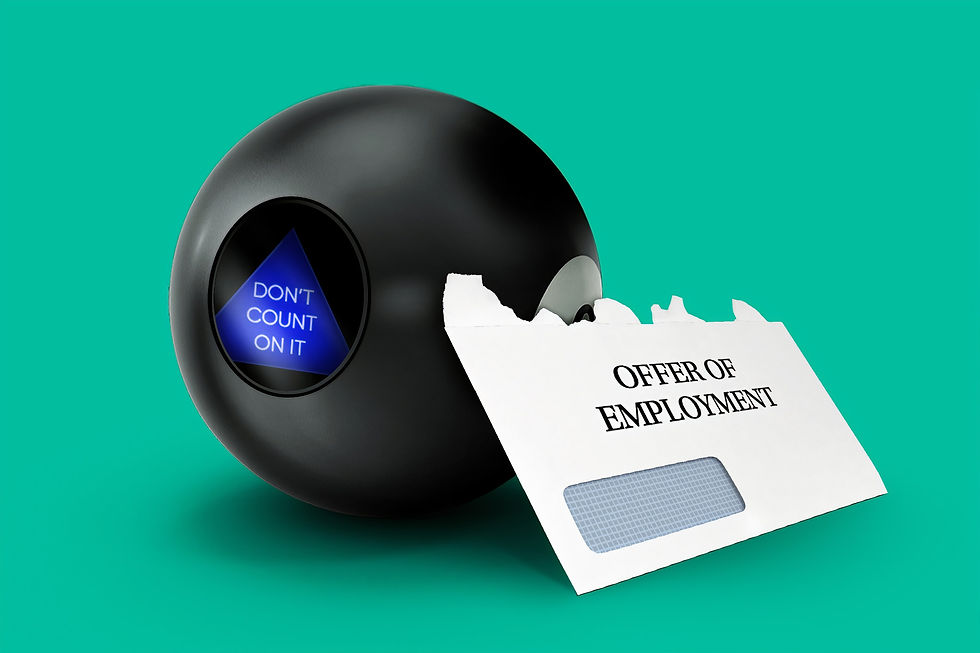Thinking of a career change? Here's what you should know
- Brianna Seedsman
- Aug 5, 2020
- 5 min read
2020 is a time of realism. We are truly seeing the best and worst of the people we work with, and, more importantly, the people we work for. If you've been thinking of making a change of career, now might be the time to look into it.
An average person is expected to change career 5-7 times within their working life.
With an increase in career choice, thanks to improvements in technology and social media, an estimated 30% of the workforce will change every 12 months.
Students and graduates (18-24) are expected to have 5-7 jobs within a 6 year period. This increase is partly due to young professionals learning the reality of their chosen career, and how it can sometimes fail to align with expectations.
So why do we change?
There are countless reasons why people change their career, but the most common reasons given are:
Seeking higher pay or better benefits/perks;
While higher earnings doesn't necessarily lead to job satisfaction, you still want to make a liveable wage. As an employee ages, their daily needs can change; a 24 year old's needs are very different to a 34 year old's needs. Bills start to crop up, rent or mortgage payments, costs of raising a family.
A lot of modern companies offer perks like; subsidised gym membership, discounts on items (i.e if you work for a retail company like The Iconic), pet-friendly workspaces, birthday leave etc. Small businesses generally won't offer things like this.
Working in a diminishing industry;
Technology, the economy and the industry itself can affect a job and its longevity. Some opportunities are no longer as plentiful as they once were, and being able to adapt in a changing workforce is essential.
Escaping a toxic work environment;
If you are unhappy, one of the first places you should look is your workplace. Long hours, colleagues, tedious work and bad management are some of the main reasons behind work-stress.
Skills, values and abilities don't fit their current job.
With websites like Glassdoor allowing potential employees to really look into their desired companies, it's important for your values to align with that of your workplace. Do you require flexible hours because you have kids? Do you like to volunteer and do charity work? Is mental health or physical health a big part of your life? Some companies will advertise these sorts of things as key values that the company holds, hoping to attract like-minded employees.

While it's important to be able to make the change from one career to the next with a wide variety of abilities and skills, there are some natural abilities that we are born with that can really help in a particular line of work. Playing towards your strengths will help you excel in your new career.
Some positives of a change
There are countless reasons for and against a change in career. Some of the most common positives that are listed are:
Developing new skills;
Having a complete career change pushes you out of your comfort zone, and forces you to learn new systems, routines, names and people skills. Maybe in your old job you never had to interact with customers, and in the new one you do. This is a verbal communication skill that you will now develop.
It can also be helpful if you're thinking of starting your own business it the future; learning different companies business structures can give you ideas on what would best suit your business.
Better pay/benefits/perks;
Developing skills and experience from previous jobs means future employers are more likely to offer a higher pay package to get you on their team. Another benefit? Annual raises are (usually) based as a percentage of a base salary.
If that isn't enough: Forbes has said that workers who stay with a company for longer than 2 years earn 50% less than their job hopping equivalents.
New relationships and connections.
Not only is it fun to potentially meet your new work best friend, but colleagues can introduce you to valuable connections in new industries that you previously weren't exposed to, which can help for future opportunities or going out on your own.
And on the opposite end?
With positives there will always be negatives. Consider things like:
Unwanted reputation;
Being known as "that person that is always leaving" is kind of a bad rep to leave behind in a place. Employers also might consider training you to be a waste of their time and money if you are just going to leave within a year or two.
The grass isn't always greener;
Leaving your current job because of a toxic environment? You might end up in a job with fewer options to progress, more stress, bad management and bad colleagues. It's important to do thorough research to not end up in the same situation.
Modern job market competition;
The job market is tough and has been for a while. Most jobs require some form of degree, an detailed resume and cover letter, previous experience or volunteer work and employers put potentials through an intense interivew process that can be daunting for a lot of people. If you haven't been in the market for a while, this might be a shock to the system.
Less job security.
It can happen to any one at any time, but if a company is downsizing, you could be one of the first to be let go as you haven't had the time to build up seniority.

How can you best prepare for a change
This depends on your age, qualifications and what market you are jumping from and into. General advice that can be taken across the board?
Self-assessment.
In this you must evaluate;
skills;
This can relate to things like previous degrees or diplomas that might help across multiple fields. It can also relate to hard skills (proficiency in technical software like Adobe etc) and soft skills (communication, team work, leadership etc).
interest;
Having personal interests is good and can mean you know a lot about something, which might help you progress faster in a certain industry.
personality;
Don't apply for jobs that are going to be hindered by your personality. Not a good people talker? Maybe avoid sales careers.
any gaps.
This is anything you can solve like gaps in education or technical skills. Some businesses provide their employees with relevant training (i.e Certificates or Diplomas). It is always helpful to have previous training and knowledge prior to going into the job.
There are tools online that can generate occupations that are deemed appropriate based on the answers you give.
Use transferable skills if you can!
The 'key skills' are; technical, communication (verbal and written), critical thinking, multitasking (time management and organisation), teamwork (collaboration), creativity and leadership.
A lot of these skills can be used across the board, and it's important to highlight in your cover letter and interviews how you could use these skills to the employers advantage.
Use strengths and interests!
These are natural talents that other people compliment you on that can help you move up the ladder faster and into better jobs.
Interests indicate a lot of knowledge and passion on a subject, which is important in the employers eyes. Like music but not necessarily instrumentally inclined? There's jobs in the industry still! Agents, directors, marketing, social media etc.
And most importantly...
DON'T SABOTAGE YOURSELF

This means no negative talk, no excuses, no blaming others for any mistakes. Cut out any and all toxicity from your life, even if that means some of your closest friends. You don't need someone whispering in your ear than you aren't good enough for a certain job.
Don't even think about settling for a job you don't want. We hear all the time that we should 'feel lucky that we even have a job' and 'should be grateful' for it. That doesn't mean you should just settle for a job you have no interest in and that makes you feel like crap.
Focus your search; be clear on what you want, why you want it and what qualifies you.






Comments